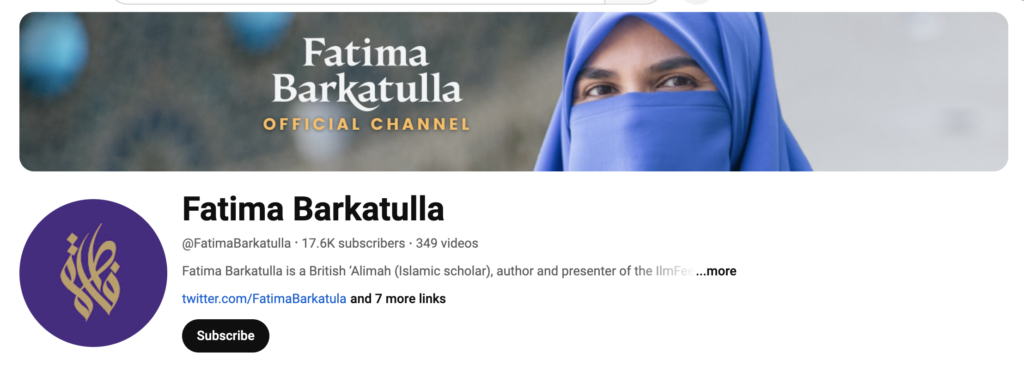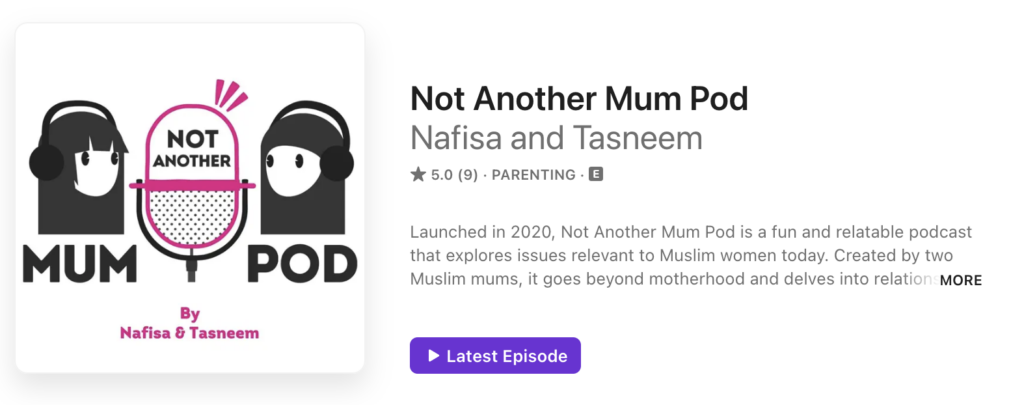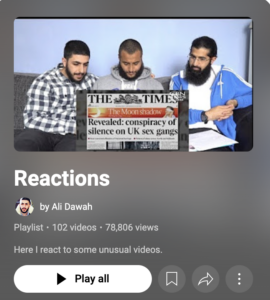
It has been said that podcasts are to radio what online streaming has become to television, the main difference being that most podcasts are free to access. Recent years have seen the medium of the podcast emerge as a platform of choice for a range of Muslim content creators. As new media platforms continue to grow, podcasting provides a convenient and relatively low-cost means of creating content. Like other podcasters, Muslim podcasters are implicitly concerned with gaining followers, attracting new audiences, and monetisation, and to this end, many will court controversy by discussing taboo subjects and/or triggering confrontation with other content producers. Podcasts attract diverse audiences by addressing a range of conversation topics, covering faith, Muslim identities in diasporic communities, gender dynamics, racism, Islamophobia and commentary on popular culture. Their popularity and influence among younger demographics have contributed to the displacement of traditional Islamic authority, as lay individuals are increasingly shaping the thought and practices of lay Muslims.
Like other podcasters, Muslim podcasters are implicitly concerned with gaining followers, attracting new audiences, and monetisation, and to this end, many will court controversy by discussing taboo subjects and/or triggering confrontation with other content producers.
The nature of the podcast as a longform conversation means that it stands as distinct from other forms of digital content, where the short form dominates. Other platforms used by content creators, such as TikTok, Snapchat, Instagram and even Twitter are generally all about scrolling. The emphasis is on getting across a concise and impactful message in an attention-grabbing way. The podcast, in contrast, calls for sustained engagement, typically for an hour or sometimes much longer.
Podcasts are often consumed in the background while the listener engages in other activities, but equally, for some audiences, we find that podcasts are seen as a source of analytical/educative content to be studied. However, it is not always only about the longform. Often podcast content takes a conversational approach and is sliced into short clips that are then circulated with ease on other platforms. Optimised for high levels of interaction and for their shareability, these clips can then go viral, and elicit responses and engagement from other content-creators and platforms. In this ecosystem, accuracy is less of a concern than audience, such that short clips are often shared far and wide, shorn of context or crucial aspects of the broader discussion within which they occurred.
The Medium and The Message
There is a fascinating contradiction to the podcast. At one and the same time, it is extensive and thorough, while simultaneously acting as a rich bank of material to be farmed for short and snappy, (even click-baity) excerpts, which are in turn shared for wide dissemination and ideally, virality. In this regard, as digital content goes, podcasts make for a unique point of analysis. The podcast stands distinct because unlike most other content which is short-form and concise it is all about giving time and attention to the extensive discussion of an issue. Indeed, podcasts are now often parodied and critiqued for being rambling, long-winded and sometimes egocentric vanity platforms. Nonetheless, the nature of podcasts as a more intimate space of conversation between two or three people allows for frank, no holds barred discussions. The conversation style is often laid-back and informal. Even for serious topics, there is room for humour and banter – setting the podcast apart from the more traditional interview style. In this way, we are offered a window into a relatable and relaxed conversation; it is as though the conversation is happening organically, with participants oblivious to the audience – yet this is juxtaposed with the very tangible awareness that podcasters and their guests have of their audiences and their reach. It is perhaps the coexistence and entwinement of these inherent contradictions – that intimate, cosy space of informality, alongside the performativity that comes with creating content for maximum reach – that makes the podcast medium such a rich locus of study from which to understand current trends within contemporary Muslim digital spaces.
The Rise of British Muslim Podcasters
In the UK, some of the popular British Muslim podcasts include IlmFeed Podcast, Freshly Grounded and The Muslim Vibe. In our fieldwork for the Digital British Islam project, participants expressed concern about a perceived tension between captivating and retaining audiences through performativity and efforts to maintain authenticity. There is a cognisance of how algorithms impact visibility and engagement and content creators factor this into how they release content: including timing, choice of headlines and hashtags, the tagging of other content creators and the highlighting of phrases and images, to mention but a few.
Other participants spoke about how refreshing it was for them to produce and to engage with podcasts. Fatima Barkatulla, a scholar, author and public figure, who presents podcast episodes for IlmFeed, spoke about how emancipatory it was for her to be able to speak at length on her own terms, in a safe space, without the pressure of having to get her message across concisely in an allotted time, often in response to hostile or suspicious questioning – a common experience she had when engaging with the mainstream media as an interviewee.
Focus group participants talked about how they were able to have podcasts playing in the background as they went about their busy lives – driving, cooking or carrying out chores. The podcast meant they could keep their brain ticking and maximise their use of time as they carried out functional everyday tasks. But even for those who saw podcasts as a space of positivity – whether for learning or expression, their appreciation was tempered by concern. Some cited the worry that the long-form nature of podcast conversations could make it easier for them to become echo chambers. In particular, Muslim rights discourse was cited in that regard. Others were of the opinion that the podcast scene was something of an echo-chamber unto itself and that content creators within it had developed an inflated sense of self regarding their own influence and reach. In that sense, they were playing to a crowd and their perception of the extent of that audience was inaccurate and overblown.
Gender Dynamics in Podcasting
One of the main issues currently animating discussion within these spaces are: feminism, the role Muslim women in society and gender relationships. If one surveys female platforms, it appears that Muslim women have different concerns compared to their male counterparts and seem to be more interested discussing everyday matters such as education, family, health and the realities of living as Muslims in a minority context. For instance, shows such as the Amaliah Podcast, Honest Tea Talk and Not Another Mum Pod focus on faith, culture, relationships and motherhood from a Muslim woman’s perspective, while offering critical reflections on religious norms and practices. These conservations provide an alternative to the male-centric spaces of traditional mosques or religious seminars, where female presence is often either formally limited, or where many females report feeling inhibited from fully participating.
Our research also identified differences between Muslim male and female podcasters in the ways males speak about women on male-hosted podcasts. Popular male-led platforms often have a particular of view of Muslim women and their role in society and discuss male-female dynamics within the paradigm of aggressive masculinity movements such the “Muslim Red Pill” phenomenon, also referred to as “The Muslim Manosphere” or “Alt-Wallahs.” These online Muslim communities of men are highly mobilised, engaged and frequently angry about not being able to carve out their own space within the West’s “culture wars,” where debates about gender, race, multiculturalism, and religion have been cast as crises. Perhaps the best known in this genre is Mohammed Hijab and his friend and collaborator ‘Ali Dawah.’ Both have a substantial following on their different social media channels and are known for their combative styles when engaging non-Muslims in Speakers Corner in Hyde Park, London. Their rising popularity has also incentivised intra-Muslim confrontation and cancel-culture, while obfuscating important debates with disinformation.
In an interesting convergence of this highly contested topical theme with the freedom that podcasts offer to discuss and explore issues in a more laid-back and curated space, Fatima Barkatulla recounted to us her decision to accept the invitation of Tammy Peterson to appear on her (eponymous) podcast where the two had a wide ranging and extensive discussion on gender roles and faith. Despite Peterson’s professional association with and support for her husband, Jordan Peterson, a prominent voice associated with white supremacist and anti-Muslim stances, Barkatulla wanted instead to focus on engaging in an authentic woman-to-woman conversation. In her words:
‘I thought, look, I am not going to follow the brothers’ approach to this interaction … I actually like her and I am just going to have a really authentic conversation. I’m going to listen, and speak, and not try to direct it too much.’ (FB interview with KE, July 2023).
For Barkatulla, a podcast conversation between two women as women allowed for frank and ingenuous conversations, despite and across political and theological deep difference. Yet for all its authenticity, this conversation was just as alive as any other podcast to the audience that it was appealing to. Barkatulla talked about accepting the invitation because it was an opportunity to present a ‘human’ view of what Muslim women are like to Peterson’s audience – an audience which may otherwise ‘never have come into contact with Muslims’.
Displacing Traditional Islamic Authority
One of the most significant consequences of the rise of British Muslim podcasters is the displacement of traditional Islamic authority. Historically, Islamic religious authority was rooted in scholars who underwent years of formal education and study. These scholars were seen as the guardians of religious knowledge, and acquired authority through accreditation and teaching at mosques, madrasas, and Islamic universities. In contrast, most popular Muslim podcasters in the UK do not have formal religious training or qualifications; instead, many rely on their personal experiences, charisma, and social media presence to build an audience.
One of the most significant consequences of the rise of British Muslim podcasters is the displacement of traditional Islamic authority.
This contrast is of particular note since many young people relate that they see their local imams and mosques as disconnected from and irrelevant to their everyday experience and struggles as Muslims in the West. Many are seen to be remote and unable to understand or engage with the challenges as a result of language barriers, generational gaps, or cultural illiteracy. This disconnect has increased disillusionment with established religious authorities and enabled social entrepreneurs to fill the void and offer relevant, less hierarchical, and more democratised fora for religious discussion. With the rise of digital media platforms, including podcasting, the locus of religious authority has shifted away from these traditional institutions and into the hands of lay Muslim social media personalities who have descended into a race-to-the-bottom through combative interaction, with some choosing to platform Far-right figures as they compete with other Muslim podcasters.
For many younger Muslims though, these digital platforms offer a more relatable and accessible form of religious engagement. This democratisation of religious discourse has allowed a wider range of voices to participate in Islamic discussions, but it has also raised questions about the legitimacy of these new digital figures. For traditional scholars, this shift represents a challenge to the established norms of religious authority. In this vein, it is notable that many established influencers or figures of religious authority have taken to routinely broadcasting ‘lives’ on their social media channels. These are essentially livestreams which (pre-planned or impromptu) are used to broadcast anything from a talk, sermon or just a take on a current issue. But unlike podcasts, ‘lives’ are more usually a monologue, perhaps sometimes incorporating some degree of interactivity such as questions or reactions from the audience. Others still have engaged in ‘response’ style videos (again many of these being live and interactive), where contentious issues and viewpoints espoused by others in the field are responded to or challenged, before an audience.
Some of our participants cited an anxiety that the rise of “YouTube sheikhs” and “Instagram imams” will lead to a superficial understanding of Islam, where religious knowledge is shaped more by popularity than by scholarly rigour. Others argue that this new generation of digital Islamic influencers lacks the depth of knowledge required to provide proper religious guidance, particularly on complex theological or legal issues.
Monetisation and the Commodification of Islam for Views
Another significant factor shaping British Muslim podcast content is the increasing pressure to commodify religious knowledge in order to attract larger audiences. In the podcasting world, success is often measured by the number of downloads and views, audience retention, and social media engagement. This focus on metrics often results in a type of content production that mirrors the broader ‘marketing’ trends of influencer culture. In line with their peers in the currently booming Muslim influencer sector, some Muslim podcasters have faced criticism for accepting sponsorship deals, running advertisements, or creating paid content, with detractors accusing them of turning religious discourse into a commercial venture. Moreover, there are serious ethical concerns about the extent of disclosure and transparency that is demonstrated by many – with very little in the way of existing commonly accepted standards and expectations in this regard, resulting in a landscape that many of our participants described as often rather confusing to navigate when it came to seeking to verify credibility or information.
This commercialisation of religious knowledge can blur the line between genuine spiritual guidance and content created for profit, further complicating the relationship between digital platforms and traditional Islamic authority.
This commercialisation of religious knowledge can blur the line between genuine spiritual guidance and content created for profit, further complicating the relationship between digital platforms and traditional Islamic authority. The commodification of religious discourse can also result in what some scholars call “Pop Islam,” where religious discussions are simplified and repackaged for mass consumption on platforms such as YouTube, Instagram and TikTok so that they might “go viral”. While this model can help reach a wider audience and make Islamic knowledge more accessible to non-specialist listeners, it also raises concerns about the depth and quality of the religious knowledge being transmitted. Additionally, a thriving ‘celebritisation at all costs’ approach to religious teaching and learning, driven in a large part by digital commodification, though not limited to digital spaces, has arguably contributed to successive controversies or even scandals relating to alleged impropriety and unethical behaviours from many such influencers-teachers-preachers. In recent weeks, the arrest and investigation of Texas-based Quran teacher, Wisam Sharieff on charges of conspiracy to produce child pornography has rocked consumers of anglophone Islamic content across the world – the horrors of these revelations were compounded by Sharieff having exploited his role with a large and well-established Islamic teaching institute to abuse students in the name of religious teaching and spiritual growth. As digitally-engaged communities continue to reel from this incident, its revelations have energised ongoing debates about appropriate ways to check and ensure credibility of online preachers, what a duty of care might look like when it comes to digital interactions, how to implement transparency and accountability practices, and what is and isn’t considered to be decorous in communications between men and women, teachers and students, influencers and ‘followers’ in such contexts. All of these debates touch the podcasting space as much as they do other digital platforms.
The drive for higher viewership and engagement is another key factor influencing the content produced by British Muslim podcasters. In the digital era, platforms like YouTube and Spotify reward content that attracts more views, likes, and shares. These metrics play a significant role in determining the visibility and reach of podcast episodes, which in turn affects the topics that podcasters choose to cover. The pressure to generate high engagement can lead to content that is more focused on clickbait-style headlines, celebrity interviews, or debates about hot-button issues, rather than in-depth discussions on Islamic jurisprudence, spirituality, or ethics.
As digitally-engaged communities continue to reel from this incident, its revelations have energised ongoing debates about appropriate ways to check and ensure credibility of online preachers, what a duty of care might look like when it comes to digital interactions, how to implement transparency and accountability practices, and what is and isn’t considered to be decorous in communications between men and women, teachers and students, influencers and ‘followers’ in such contexts. All of these debates touch the podcasting space as much as they do other digital platforms.
Conclusion
The rise of British Muslim podcasters represents a significant shift in the way religious knowledge is produced, consumed, and transmitted within the UK Muslim community. Podcasting platforms offer an accessible and flexible space for a diverse range of voices to engage with Islamic discourse, often in ways that challenge the dominance of traditional religious authorities. However, this shift is not without its challenges. Gender dynamics, the commodification of religious knowledge, and the pressures of digital metrics all play a role in shaping the content produced by British Muslim podcasters, raising ethical concerns and tensions. At the same time, the rise of new authorities in the digital ecosystem raises important questions about the future of Islamic scholarship and the continued, evolving role of traditional scholars in an increasingly digital world.





